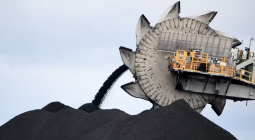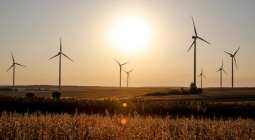Commonwealth Bank to stop financing fossil fuel companies that don’t comply with Paris climate goals

The Commonwealth Bank, Australia’s largest lender, has broken ranks with rivals and will stop financing fossil fuel companies that aren’t compliant with the Paris climate goals by the end of this year.
Clients failing to meet an emissions pathway consistent with keeping global temperature increases to the “well below 2C goal of the Paris agreement” would not receive “new corporate or trade finance, or bond facilitation with a maturity beyond 31 December 2024”, CBA said.
The bank set “core criteria” including having a medium-term emissions reduction plan to 2035 and a net-zero ambition covering at least 95% of the carbon pollution from extraction and processing, according to its annual climate report. The report was released on Wednesday along with results that included a cash profit of almost $10bn.
Market Forces, a climate lobby, hailed CBA’s shift from “the worst offender on climate and lending to fossil fuel companies to the first of Australia’s major banks to announce its break up with climate-wrecking clients”.
“[CBA] has a crystal clear message to oil and gas companies: the buck stops here and if your plans are out of step with global climate goals, we’re not going to bank you,” said Kyle Robertson, a senior Market Forces analyst.
By contrast, rivals were preparing to lend $750m to the gas giant Santos for its “massive and dangerous expansion plans”, Robertson said. “ANZ, NAB and Westpac shareholders, customers and staff will be furious these banks are breaking their climate promises again, and expect them to match [CBA] when they release their disclosures in November.”
Market Forces last month said CBA had the least exposure of the big four banks to the gas, coal and oil industries. The bank said its fossil fuel extraction financing “remains low at 0.2% of total committed exposure”.
ANZ said it had reduced its financed emissions in the power sector by a quarter, oil and gas by 30% and thermal coal by 96% between 2020 and 2023.
NAB said it stopped financing “new-to-bank thermal coal mining customers or new thermal coal mining projects” in September last year. It has had no direct lending to coal-fired power generation assets since March 2022, and had capped oil and gas exposure at $US2.28bn ($3.44bn) and put “restrictions” on future financing.
Guardian Australia also approached Westpac and Santos for comment.
CBA noted in its report there was a “growing concern that the frequency and impact of extreme weather events” was adversely affecting the insurability of homes as well as property values.
Average insurance premiums were up 28% in the year to 31 March, with 12% of households “experiencing extreme home insurance affordability stress”, the bank said.
“While insurance affordability has not yet materialised as a financial risk to the bank, we have identified it as an emerging risk, given the risk it presents to our customers and subsequently the bank,” CBA said.
The bank estimated home loans at “high physical risk” from climate change totalled $30.3bn, or 2.2% of its overall exposure. Of those, about $11bn of risk involved cyclones, $16.9bn floods, $1.8bn bushfires and $1.6bn for sea level rise.
Decarbonising also had “the potential to be significantly disruptive” in regions reliant on fossil fuels. Borrowers may struggle to repay loans, “resulting in adverse credit risk outcomes for our customers and the bank”.
Timothy Neal, an economics lecturer at the University of New South Wales, said it made sense for CBA to be concerned about the threat posed by global heating.
Researchers such as Marshall Burke in 2015 and Maximilian Kotz in 2024 had identified “future significant climate change may also have severe impacts on the Australian macroeconomy and incomes more broadly”, Neal said. “This will surely impact on the operations of banks, as it will every business.”
“Yet it is notoriously difficult to predict the scale these impacts might take, beyond noting that they could be huge and unprecedented in modern history,” he said.
“Accordingly, there remains significant climate risks that in my view are impossible at this stage to adequately assess, and every organisation talking about climate risk should be upfront about this.”





